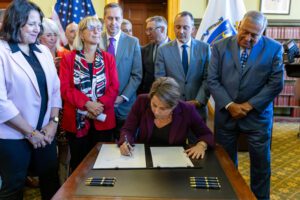Who is a member?
Our members are the local governments of Massachusetts and their elected and appointed leadership.

Gov. Maura Healey (seated, center) signs a tax relief bill today at an event at the State House. She is joined by (standing, l-r) Lt. Gov. Kim Driscoll, Senate President Karen Spilka, Administration and Finance Secretary Matthew Gorzkowicz, Senate Ways and Means Chair Michael Rodrigues, House Ways and Means Chair Aaron Michlewitz and Speaker Ron Mariano. (Photo courtesy Joshua Qualls/Governor’s Press Office)
Gov. Maura Healey this afternoon signed a tax relief bill that will provide $561 million in tax breaks and credits this year, with the value growing to approximately $1 billion once the law is fully implemented in 2027.
The House overwhelmingly approved the compromise bill on Sept. 27, and the Senate did the same on Sept. 28. The governor had been advocating for a broad tax relief package since before taking office in January.
Provisions that affect municipalities include property tax relief and housing incentives. The law will:
• Increase the maximum annual property tax deduction for seniors who provide volunteer services to a municipality from $1,500 to $2,000
• Increase the maximum available “senior circuit breaker” property tax credit from $750 per year to $1,500 per year
• Create a local-option property tax exemption for residential properties that are rented to households earning no more than 200% of area median income, and allow municipalities to determine the amount of the exemption and adopt ordinances and bylaws implementing these provisions
• Increase the cap on Housing Development Incentive Program tax credits from $10 million to $30 million annually and allow for the distribution of any portion of the annual cap on credits that were not authorized in previous years, or of any credits that were returned
The broad tax relief bill will also lower the tax rate on short-term capital gains, amend the state’s estate tax, and provide additional incentives for housing production.
The bill amends the state statute known as Chapter 62F, which requires the state to return revenue above a certain threshold to taxpayers. Chapter 62F was triggered last year when state tax collections came in far above benchmarks.